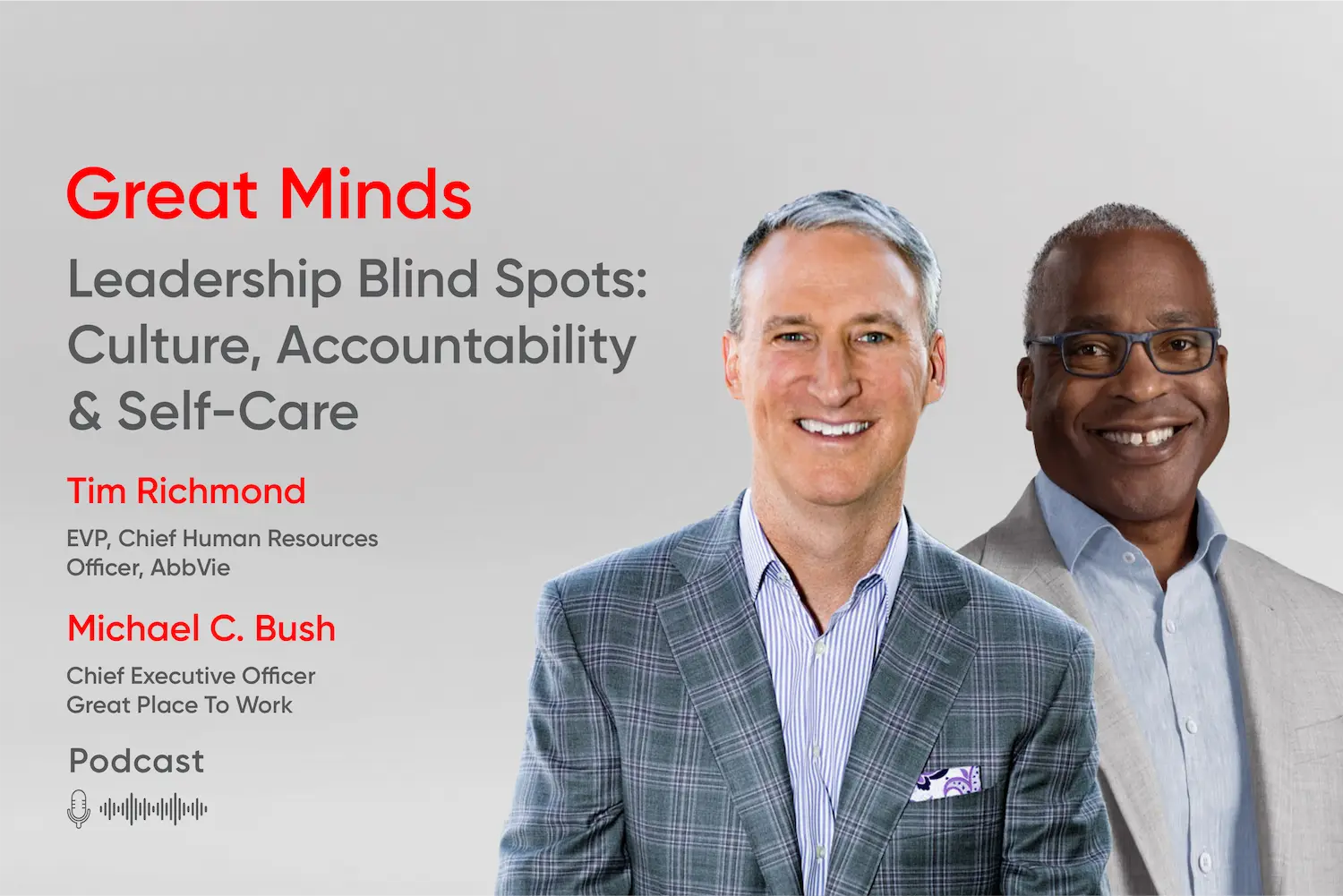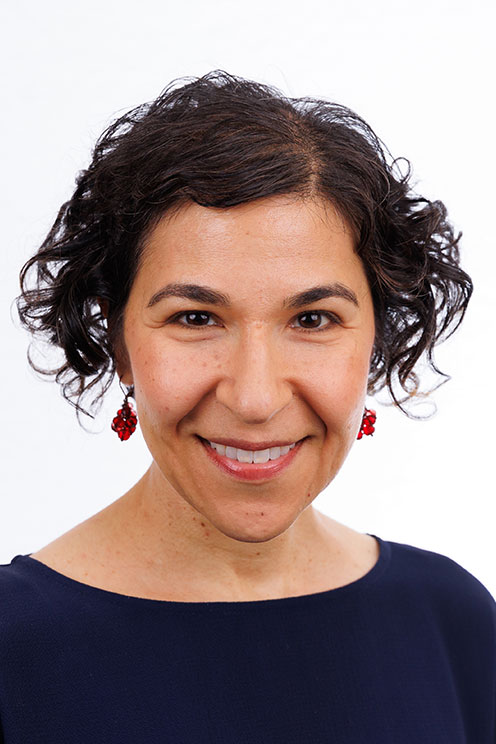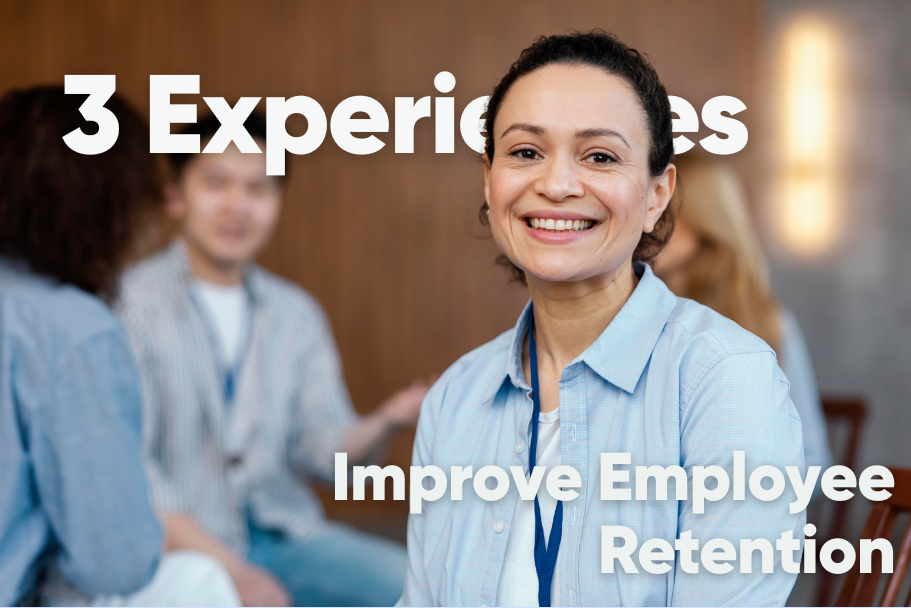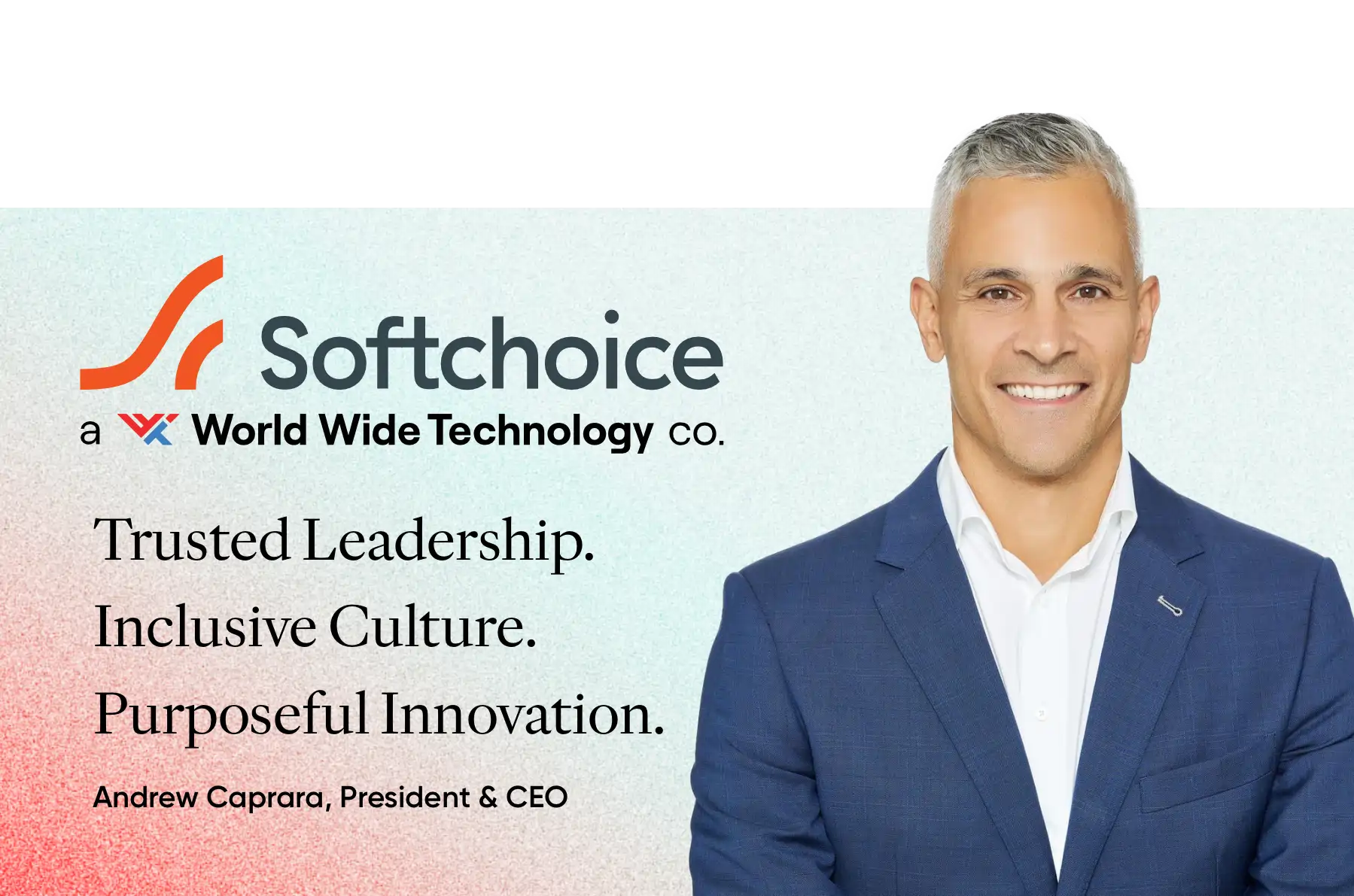On this episode of the Better podcast, we hear Tim Richmond, EVP, Chief Human Resources Officer at AbbVie, and Michael C. Bush, CEO of Great Place To Work®, talk about blind spots many leaders have around culture and engaging employees.
health, productivity, and retention.
Podcast Highlights
- Leaders’ Blind Spots and Accountability: Leaders often prioritize external changes over personal growth. The importance of holding managers accountable at every level, including frontline supervisors, is highlighted as a key factor for fostering a positive organizational culture.
- Listening as a Core Leadership Skill: Effective leadership begins with humility and active listening. Treating every interaction as a learning opportunity, regardless of the speaker’s position, creates trust and fosters a culture of collaboration and growth.
- Embedding Culture in Business Strategy: AbbVie’s success showcases the power of making culture a top business priority. Clear alignment between organizational values and practices, reinforced at every level, drives performance and employee satisfaction.
- Self-Care for Sustainable Leadership: Leaders must prioritize their own health and wellness to effectively serve their teams and organizations. Practices like meditation, exercise, and work-life balance are essential to maintaining leadership effectiveness and resilience.
They talk about a new way of leading where leaders feel accountable for every manager down to the front-line supervisor, why listening is the most important leadership behavior, and how they create a sense of well-being for themselves as leaders.
On why leaders don’t prioritize culture
Michael: This willingness to do something uncomfortable takes courage and change. Leaders are big on change in other people and companies, but not big on changing themselves. Culture work is hard. If you want to choose the easiest path, this isn't it.
You’ve got to have a lot of great leaders who are all out of the box being uncomfortable, learning, testing, knowing that humility that comes before curiosity. And then you get some of the best people in the world wanting to work in your company, which is what's needed to tackle more productivity, more performance, higher rate of innovation and decreasing our carbon footprint.
It's more complicated now and therefore you got to have the best people, which means you have the best leaders.
Sometimes people will ask me, "What if you don't have the support at the top?" I've never seen it succeed.
On the importance of keeping leaders accountable
Tim: We use surveys to get down to any manager with five or more employees and they get direct feedback across a number of dimensions and questions. We hold leaders accountable. The best managers are celebrated and the managers who are below a certain level on engagement or inclusion get extra help from the HR team.
We actually require them to resurvey. If I can elevate those that are below the standard for whatever reason -- there's been something acute going on – to the Abbvie standard fairly quickly, I've protected that experience for those employees, and that's positive for our culture.
Michael: It's pretty easy at the top to get high leadership scores, but what's happening seven levels down? And does this CEO feel accountable for that? That they can't feel like they're a great leader unless that frontline supervisor is creating a great experience? It sounds basic, but it rarely happens.
This responsibility for the whole chain of leadership and a leader at the top judging themselves by that frontline and mid-level experience, this is the breakthrough we feel and the difference over the next five years. This is the future of work.
On the most important leadership behavior
Michael: It's listening. Number one, to listen, you have to be humble because you're about to have an experience in a conversation. You have to dump your fears and preconceived notions and be willing to have your point of view changed.
So you're starting there and then you're asking questions. You have that journalist mindset because you want to learn. And you think that whether that person's an executive VP, a director, one of the leading scientists in the world, or the person working at a reception or behind the wheel of the truck in delivery and distribution, you talk to them the same way, and you think you can learn from them just as much as you can from that senior VP.
On the role of culture in Abbvie's business success
Tim: One of my proudest moments in my career has been the creation of the culture in our company. The reflection on that? It’s not easy. There were consultants back in the beginning who wanted to work with us, but told us to expect to not accomplish much. For reasons you might expect, we said, "Well, we're not going to work with them." We want to have aspirations, and we want to do the hard work. And it is hard work, and it has to be a priority.
The benefit that we had was that our chairman and CEO, Rick Gonzalez, who's still our chairman and CEO today, prioritized culture. And not all new CEOs do that. To have culture one of your top four business strategies is really powerful.
On self care
Tim: I My advice is to make your health and wellness a priority. You cannot be a good member of a family or your best self as it relates to being a member of a family or a community at work if you're not well.
Michael: I do know when my meditation game is on, I do a little better on the exercise game. I'm a road warrior, so I pack the shoes and go work out at 2 a.m. sometimes due to time zones. But boy, do you get rewarded for doing that.
FAQs
- How can we hold leaders accountable for culture and employee engagement at every level?
Application: Use employee feedback surveys to assess leadership performance, celebrate top performers, and provide support and development plans for managers falling below standards. Ensure accountability extends from senior leadership to frontline supervisors. - What steps can leaders take to become better listeners and improve workplace culture?
Application: Leaders can start by practicing humility, actively listening to feedback, and treating every interaction as a learning opportunity. This involves creating open communication channels and fostering a culture of mutual respect and curiosity. - How can we integrate culture into our business strategy effectively?
Application: Define a clear cultural philosophy aligned with organizational goals. Reinforce it consistently through recruitment, talent development, rewards, and regular assessments to ensure alignment and measure progress. - What can leaders do to sustain their own well-being while managing organizational challenges?
Application: Prioritize health and wellness through practices like meditation, exercise, and maintaining work-life balance. Encourage leaders to model self-care for their teams to create a supportive and productive environment.
Tools & Resources
- Company Culture: As discussed in the podcast, embedding culture as a core business strategy is critical to performance and employee satisfaction. Explore our resources to help you build a resilient, trust-driven culture that enhances engagement and mental well-being.
- Employee Engagement: Inspired by the conversation on listening and accountability, our tools provide strategies to foster meaningful engagement, reduce stress, and create a more motivated and productive workforce.
- Leadership & Development: Leadership is at the heart of a thriving organization. Discover how our programs empower leaders to prioritize accountability, inspire collaboration, and support employee well-being, as emphasized in the podcast.
- Diversity and Inclusion: Leadership is at the heart of a thriving organization. Discover how our programs empower leaders to prioritize accountability, inspire collaboration, and support employee well-being, as emphasized in the podcast.
Feedback
our input drives our mission to create meaningful change! We’d love to hear how the ideas shared in this podcast—on leadership, accountability, and fostering well-being—resonate with you. Did these strategies spark new approaches for your organization? Is there a topic you’d like us to dive deeper into? Your feedback helps us refine our resources to better serve your needs. Have thoughts to share? Let us know by filling out this form:click here.
Get Certified 
Think your company is a Great Workplace? Get certified today to make it onto our best workplaces lists.
Original Podcast Published by Great Place To Work® USA : Click here to visit the page.







